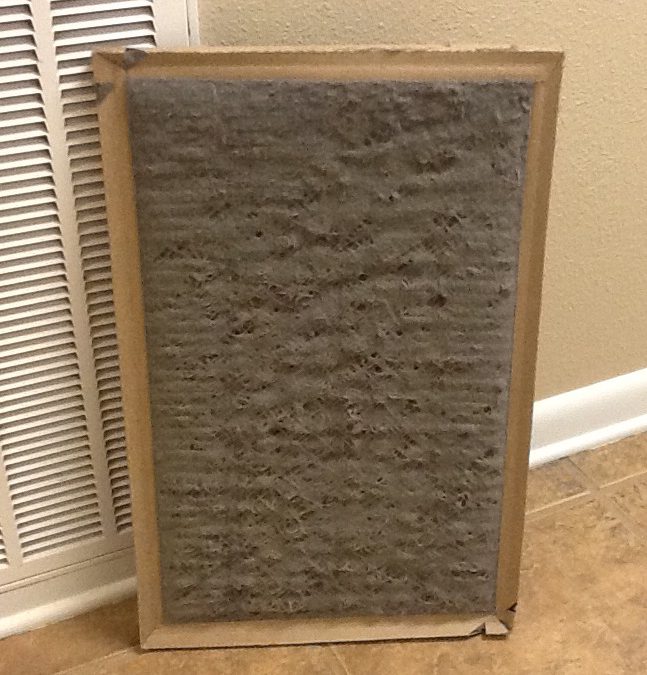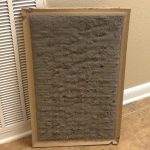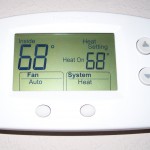
by Judy Corbus | Aug 28, 2024
With summer in full swing, you’ve probably noticed an uptick in your electricity bill. The hot temperatures and high humidity have been giving your air conditioner a real workout! Since your heating, ventilation, and cooling (HVAC) system uses the most electricity of any item in your home, taking steps to improve its efficiency will save energy and money. Try these five easy ways to stay cool for less:
Adjust the thermostat. Set the air conditioner thermostat to 78o F. For every degree setting below 78o F, you spend up to 4% more in cooling costs.
Use fans. Ceiling and floor fans move air to create a breeze, which can make a room feel up to four degrees cooler than the actual temperature. This allows you to set the thermostat higher and still be comfortable. Ceiling fan blades should move in a counterclockwise direction to create a downdraft – you can adjust the direction by moving the switch located on the side of the motor casing. Tip: Fans cool people, not rooms, so turn off the fan when you leave the room to save more money on your power bill.
Use window coverings to control sunlight. East- and west-facing windows catch the brunt of the sun’s heat, adding extra warmth to those sides of your home. Keep blinds and drapes closed to block out morning or afternoon sunlight so your air conditioner doesn’t have to work harder to cool those rooms.

A dirty filter forces your HVAC system to work harder, raising your power bill and shortening the lifespan of the unit.
(Photo source: Judy Corbus)
Change the air filter. Dirty air filters restrict airflow and may cause the HVAC system to run longer, increasing your energy bill and potentially shortening the life of the unit. Many newer HVAC systems shut down if the filter becomes too clogged for air to pass through the filter; this prevents the compressor motor from overheating. When this occurs, a service technician must inspect and reset the unit, resulting in a service charge. During periods of high use or if you live in a dusty area or have pets, check and change your filter monthly, even if the filter is labeled to last three months. Pick a day that’s easy to remember, like the first of the month or when you receive your power bill in the mail. Make sure you use the filter type and size recommended by the manufacturer for optimal efficiency. While you’re at it, dust your ceiling fan blades, too!
Have your HVAC system serviced at least annually. Schedule a maintenance check on your unit at least once a year. A trained technician will check the coolant level, drain line, and overall system to make sure everything is operating at peak efficiency. If you live in a manufactured home, it’s especially important to check the ductwork to ensure it has not separated at the seams, resulting in a loss of cool air inside and higher electricity bills. Routine maintenance will head off potential problems, extending the life of your unit and promoting efficient operation for reduced power bills. Tip: Prune back shrubs that may block airflow to your air conditioner compressor.
These simple tips will help to cool down your power bill while you stay cool!
For more energy-saving tips, visit the Florida Energy Systems Consortium.
An Equal Opportunity Institution.

by Judy Corbus | Jul 10, 2018

Check your air conditioner filter monthly and replace when dirty.
Photo Source: UF/IFAS Northwest District
When the temperature is in the 90s and the heat index in the triple digits, you certainly don’t want your air conditioner to conk out! Follow these simple steps to keep your AC running efficiently and to save money on your electric bill:
Check the filter monthly. Your air conditioner’s filter catches dust, dirt, and allergens to keep your home cleaner. During periods of high use, like summer, a lot of air passes through the filter so it can become dirty more quickly. If you live in a dusty area or have pets, these, too, can “fill” your filter so be sure to check your filter monthly and clean or change it as needed. Some filters are washable and reusable, such as in window unit air conditioners. To clean, turn off the unit and remove the filter. Wash in warm, soapy water and allow to air dry; reinstall in unit. Replace the filter if it is worn or torn. Inspect and replace window seals to prevent cool air leaks.
Central air conditioning systems typically use disposable filters. Turn off the system to prevent dust and dirt from entering the unit while you are cleaning it. Open the intake grate and remove the filter. Hold the filter up to a light; if you see very little light through the filter, replace it. Make sure to install the new filter so the air flows in the direction indicated by the arrow on the filter frame. Also, dust the grate with a soft cloth. Use the filter type recommended by the manufacturer for best performance; keep a supply on hand so you can change them regularly. Pick a day of the month, such as the 1st or when you receive your electric bill, to check the filter. This also is a good time to dust your ceiling fan blades.
Does a clean filter make a difference? A clogged filter makes your air conditioner work harder to pull air through the filter. Many of the newer air conditioning units now have a safety feature that shuts down the unit if air cannot pass through the filter to prevent the compressor from overheating. When this happens, a service technician must inspect and reset the unit, resulting in a service call charge. Getting in the habit of checking and changing your filters regularly will keep your unit operating efficiently and extend its usable life. You can reduce your air conditioner’s energy consumption by 5 to 15 percent by maintaining clean air filters (www.energy.gov).
Clean leaves and other debris from the fan, compressor, and condenser. Trim shrubbery so it is at least two feet away from the outside unit to allow for proper air flow.
Check and clean the evaporator coil every year.
Use a “fin comb” (available at hardware stores) to straighten bent coil fins.
Twice a year, insert a stiff wire through the drain channels to clear and prevent clogs, which can lead to backups and flooding.
Have your air conditioner serviced at least once a year. Spring is an ideal time to have a qualified service technician inspect and service your unit so it can handle the demand of the hot summer months.
Keep your “cool” this summer with these maintenance tips!
For more information, visit:
Energy Saver 101: Everything You Need to Know About Home Cooling
Florida Energy Systems Consortium
by Judy Corbus | Jan 27, 2014

Set your thermostat to 68 degrees or lower in the winter to reduce heating costs.
Winter definitely is here! Thankfully, we are not shoveling snow here in the Panhandle like our neighbors to the north, but our electric bills most likely have risen as the mercury has dropped. To save money on your winter heating bill, follow these tips:
- Set thermostats no higher than 68ºF when people are home.
- Lower the thermostat when you sleep or are away from home. The Energy.gov website states that if the setback period is 8 hours or longer, savings of as much as 1% for every degree setback can be achieved.
- Put on a sweater or warmer clothing for comfort and lower the thermostat even more. Layer clothing. Closed or tighter cuffs and collars help to retain body heat. An extra blanket or throw will keep you toasty with a lower thermostat setting.
- Use ceiling fans to circulate heated air. Most fans have a switch that allows users to adjust the direction of the fan blade movement. Set fans to move in a CLOCKWISE direction in winter. The upward air flow will move stagnant hot air off the ceiling area and down into the living space. This allows for a lower temperature setting on your heating unit without a reduction in the comfort level.
- To ensure the heat gets to where it is supposed to go, use mastic or foil-faced tape to seal the seams and any cracks in air handling ducts.
- Have the heating system serviced each year to ensure efficient operation.
- Check caulking and weather stripping around doors and windows. Replace as needed to reduce heat loss.
- Clean or replace heating system filters. Dirty filters reduce the efficiency of the heating system and waste valuable fuel. Check filters monthly and clean or replace as directed by the manufacturer.
- Do not place furniture and curtains over or around the heat registers or in front of cold air returns. These items will block the airflow.
- Never use the stove for additional heat. It is dangerous. Besides causing a fire hazard, fumes given off by combustion from gas appliances can result in increased carbon monoxide levels.
- On sunny days, open blinds, shades, and curtains, especially if your windows face south. At sunset, close the blinds, shades, and curtains to help keep heat in your home. This really makes a difference.
For more household energy saving tips, visit the UF/IFAS Energy Efficient Homes series.
Source: No to Low Cost Actions to Save Home Energy and Money
by Shelley Swenson | Jul 23, 2012

Photo by Les Harrison, Wakulla County Extension Director
Welcome to the Florida summer!!! Feeling the heat? No pool to cool off in? Running your air conditioner and then feeling blue when the bill arrives? Let’s review some basics in energy-efficient use of your air conditioner. Perhaps you and your family could make some small changes that could result in money being saved. Quick Facts: Did you know that…..
- Heating, ventilation and air conditioning (HVAC) account for more than 40% of your utility bill?
- For every degree setting below 78˚F, you spend up to 8% more in cooling costs?
- Upgrading your system can reduce your air conditioning costs by a significant amount. Is it time to consider doing so?
Short-term solutions to improve the efficiency of your existing system include…..
- Set your thermostat at 78˚ F or higher.
- Use bath and kitchen fans sparingly when the air conditioner is operating.
- Inspect and clean both the indoor and outdoor coils. The indoor coil in your air conditioner acts as a magnet for dust because it is constantly wetted during the cooling season. Dirt build-up on the indoor coil is the single most common cause of poor efficiency. The outdoor coil also must be checked periodically for dirt build-up and cleaned if necessary.
- Shade east and west windows.
- Delay heat-generating activities, such as dishwashing and drying clothes in a clothes dryer, until the evening on hot days.
- During most of the cooling season, keep the house closed tight during the day.
- Try not to use a dehumidifier at the same time your air conditioner is operating. It increases the cooling load and forces the air conditioner to work harder.
- Consider installing ceiling fans to circulate the air more effectively. The improved circulation will make you feel cooler.
- Install a programmable thermostat. You can then schedule the time blocks during which your heating or air-conditioning system operates. As a result, you can set the equipment to more economical settings—such as lower temperatures in winter while you are asleep or when you are away from home. Choose one that can store and repeat multiple daily settings, so that you can have both a workday and a weekend heating/cooling timetable.
We have such great resources from our UF/IFAS Specialists available to you. This article was adapted from Factsheet FCS 3262 Energy Efficient Homes: Air Conditioning This publication includes information on understanding terms used in the industry, how to purchase a new unit, and questions you should be prepared to ask and answer when working with a HVAC representative. Contact your County Extension Family and Consumer Sciences Agent with further questions or for a copy of this factsheet. For additional factsheets on energy efficiency and other topics, visit http://edis.ifas.ufl.edu.
Author: Shelley Swenson, Family and Consumer Sciences/EFNEP Agent, UF/IFAS Wakulla County Extension

Shelley Swenson
UF/IFAS Extension Wakulla County
Family and Consumer Sciences/EFNEP Agent







